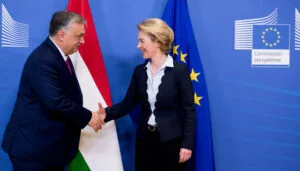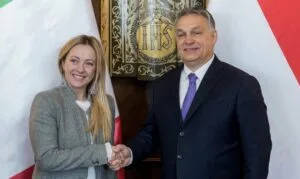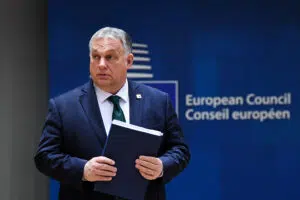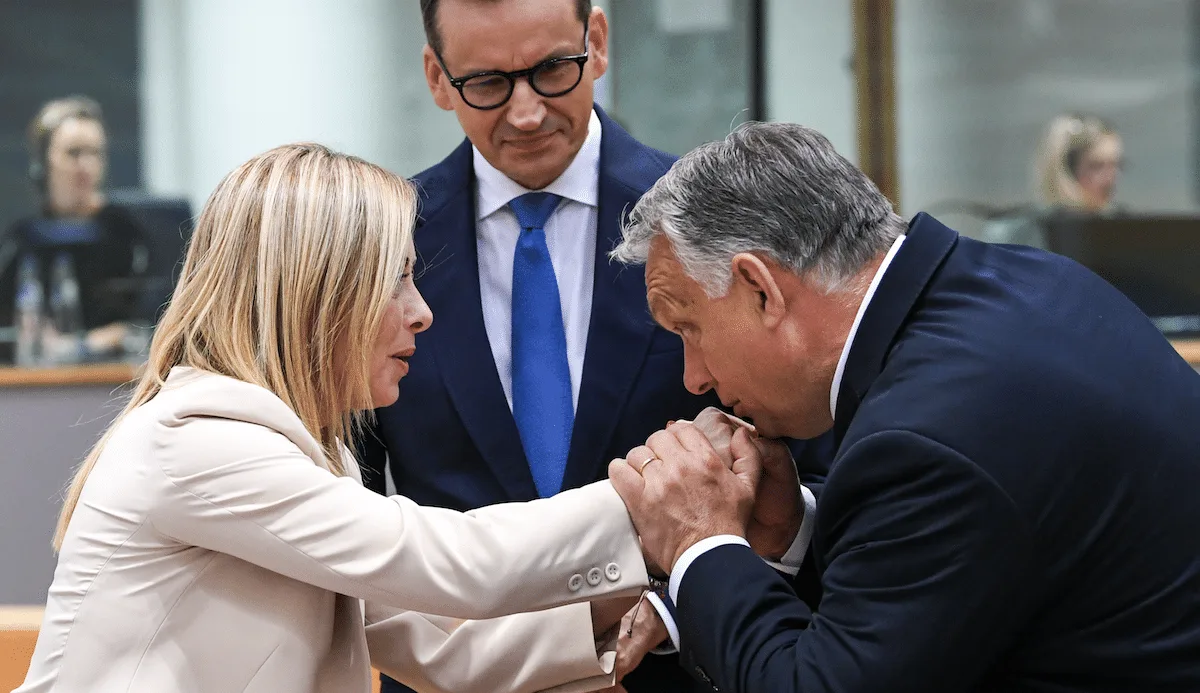Brussels – The test of the vote on one of the hardest dossiers of the European Parliament against Hungary offered few surprises, but what emerges from the positions of political groups in general and Italian MEPs, in particular, is that on such crucial issues for the European Union as the respect for the rule of law, there is no majority among right-wing forces. For if Fratelli d’Italia and Lega (together with their respective groups of European Conservatives and Reformists and Identity and Democracy) stand in support of Viktor Orbán, Forza Italia and the European People’s Party are unwilling to make concessions even to the very Commission they support. The same one that, only a month ago, decided to release—controversially to say the least —10.2 billion euros in EU funds to Budapest.

The resolution, approved by 345 votes in favour, 104 against, and 29 abstentions, is based on two main points. The first is the recourse to Article 7 of the Treaty on European Union, which is the mechanism that allows suspension of EU membership rights in the event of a “serious and persistent” violation of the founding principles of the Union by a member country: “We call on the European Council and member states to take action and determine whether Hungary has committed serious and persistent violations of the values of the EU,” reads the text of the resolution, which at the same time “deeply regrets that the council has failed to make significant progress” in the same procedure requested back in 2018. The second point is on starting the process to take to the EU Court of Justice the Commission’s decision to unfreeze the €10.2 billion in EU funds to Hungary: “The European Parliament instructs the Committee on Legal Affairs to take the necessary steps as soon as possible” to “re-examine the legality of the decision before the Court of Justice of the European Union,” given the possibility for the European Parliament to “use all legal and political measures at its disposal if the Commission unfreezes the funding without the criteria being met or if it fails to ensure full implementation of the relevant legislation.”
Faced with an almost foregone vote result on the text as a whole, it is interesting, however, to consider how the political groups and their respective parties took sides on an issue as diriment to the Union as the respect for the rule of law. In favour of the resolution were the Democratic Party (S&D), Italia Viva (Renew Europe), the 5 Star Movement and, above all, Forza Italia (PPE), whose MEPs once again highlighted with their votes the impracticality (at least at the moment) of a structural alliance of right-wing political forces in Brussels. Only the Lega (ID) and Fratelli d’Italia (ECR) opposed with their votes, along with those of all other parties of the European far right, any kind of action to deprive the Orbán government of access to EU funds and membership rights. When the June 6-9 European elections are less than five months away, it must be remembered that the door of the Party of European Conservatives and Reformists (chaired by Italy’s premier, Giorgia Meloni) is open precisely to Orbán’s Fidesz party, and this could be a further element of friction in the relations between popular and conservative parties. Not to mention the words of the president of the EU Parliament, Roberta Metsola, to rule out confrontations with the far-right parties represented by the ID group: “When we go to the elections in June, we have to propose a pro-European choice to the citizens.”

A final piece of analysis of today’s (Jan. 18) vote concerns two amendments—both of which did not pass—that proposed even stronger positions against Hungary. The first amendment was the one announced and tabled by the liberals of Renew Europe for a motion of censure against the EU Commission if more funds are released to Budapest (ahead of the February 1 Extraordinary Council meeting where Orbán might put a new veto to financial support for Ukraine). The motion of censure is a measure by which the EU Parliament expresses its negative opinion on the work of the executive and, if approved, forces the members of the college of commissioners to resign. Forza Italia—sharing the decision of the EPP—voted against it, but the Democratic Party did not follow the indication of its home group and sided in favour along with the 5 Star Movement and Italia Viva. On the other hand, the second amendment was submitted by the Left Group and called on the Council “to use its powers to change the configuration of the Council presidency in order to suspend the Hungarian presidency” starting July 1. In this case, even the PD sided against it—with the other S&D and right-wing parties—leaving only Italia Viva (en bloc with Renew) and the 5 Star Movement to support the tougher proposal.
EU funds frozen and unfrozen for Hungary
According to the more accurate data provided in May 2023 from the commission services, the EU funds for Hungary frozen by Brussels stand at 28.6 billion euros, divided into three macro-areas: National Recovery and Resilience Plan (5.8 billion), Cohesion Policy Funds (22.6 billion), and Home Affairs Funds (223 million). The three paths proceed in parallel, each with a specific procedure (or several, depending on the nature of the funding). The first considers the “27 super-objectives” on the rule of law set on November 30 last year by the commission to release Hungary’s NRRP funds, or 5.8 billion in grants (plus the 4.6 billion from the RePowerEu chapter, of which more than 900 million in automatic and untied pre-financing have already been disbursed).

The second chapter—definitely the most complex—is about the cohesion policy funds, which for Hungary are worth a total of 22.6 billion euros as funding from the EU budget. Of these funds, 6.3 billion were frozen through the rule of law conditionality mechanism by a Council decision in December 2022 (and which remain frozen). This is a separate procedure involving 55 per cent of the funds allocated to Hungary from three operational programs financed by the European Regional Development Fund (ERDF), the Cohesion Fund, the Just Transition Fund (JTF), and the European Social Fund Plus (ESF+): “Environment and Energy Efficiency Plus”, “Integrated Transport Plus”, and “Spatial and Settlement Development Plus”.
Of the remaining 16.3 billion, 12.9 billion were tied only to the implementation of judicial reforms (without additional criteria) and these are the ones that were partly unblocked by Brussels after the review request. The remaining 3.4 billion are blocked due to non-compliance with other horizontal enabling conditions—that is, necessary conditions as far as the EU Charter of Fundamental Rights is concerned—in three disputes between the commission and Hungary: the “child protection” law (the anti-Lgbtq+ law), the academic independence law, and the treatment reserved for asylum seekers law. The first issue is responsible for stalling 3 per cent of the cohesion policy budget (i.e., 678 million), the second 9 per cent (over 2 billion), and the third an additional 3 per cent (another 678 million). To unlock these funds it is not enough to put an end to the issues related to the independence of the judiciary (although it remains a pre-requisite for all of these) since the pending issues regarding the other horizontal enabling conditions must also be resolved.
Finally, there is the last issue to consider, the one of the 179.9 million from three Home Affairs Funds programs. As Eunews learned in February 2023 from sources inside the EU executive—and then confirmed again in mid-November—it concerns 54.92 million from the Asylum, Migration, and Integration Fund (AMIF), 87.2 from the Border Management and Visa Instrument (BMVI) and 37.8 from the Internal Security Fund (ISF). One month after the unfreezing of the total 10.2 billion for Budapest, the same sources confirm that all ISF and BMVI funds (tied exclusively to judicial matters according to implementation decisions) have been released, but also the AMIF funds related to legal migration and integration to the tune of 17.68 million, while only those related to non-refoulement (returns) to asylum access, namely 37.24 million, remain blocked in this chapter. All in all, of the Home Affairs Funds, 142.68 million have been unfrozen.
English version by the Translation Service of Withub








